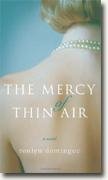 “I learned the constellations when I was little…At one time, I believed the mythological creatures and objects were truly there, held in place by giant pins. The light points of their configurations, you see. I thought if any of those pins came loose, they would be at the mercy of thin air – and they’d fall to the ground and crush me. So for a couple of years, I’d only go outside on cloudy nights. I decided that would give them something on which to land, other than me.”
“I learned the constellations when I was little…At one time, I believed the mythological creatures and objects were truly there, held in place by giant pins. The light points of their configurations, you see. I thought if any of those pins came loose, they would be at the mercy of thin air – and they’d fall to the ground and crush me. So for a couple of years, I’d only go outside on cloudy nights. I decided that would give them something on which to land, other than me.” An astonishing novel is always a gift to readers but, when that gift comes as a debut novel, the reader is left floundering. How can this illuminating author be so in tune with her craft so early in her career? Ronlyn Domingue has gifted the world with a literary novel that is unique on so many levels; a novel that compels the reader to think and to challenge their conception of reality and love, as well as the construction of the novel itself.
The Mercy of Thin Air is first and foremost a novel of discovery. Set in the past, present and “between”, on the surface level, it tells the story of Raziela Nolan, who dies before experiencing most of life. Razi reflects on growing in the 1920s as a woman determined to become a doctor and who becomes a fierce advocate for women’s emancipation and reproductive rights. Through her narration, readers are slowly drawn into the story of her love affair with Andrew and the circumstances of her death. Interspersed into these reminiscences, Razi spies on the turbulent relationship of Amy and Scott, a young couple whose home she currently inhabits.
On a deeper level, this novel delves into philosophy, on the nature of love and loss, existence and memory. Grief defines characters in The Mercy of Thin Air. It is a buffeting force that polishes some into individuals who are lean in emotion, able to withstand the all-consuming nature of grief. Others give into loss and live in the pit of despair. Domingue provides readers with subtle examples of the role this enigmatic emotion can play in our lives and beyond. Emotions, for some, are the mooring that holds us in place – the pins – which can be dislodged by an overflowing of strong feelings, leaving us in a free-fall where anything can happen. This theme – “the mercy of grief” – creates a strong foundation in the novel.
The Mercy of Thin Air also provides an interesting insight into the history of women’s rights. Both Razi and Amy are heavily involved in activism and it is this political aspect of their natures which draws Razi to explore the mysteries surrounding Amy’s life. Domingue cleverly utilizes this plot line to force readers to confront their personal views on reproductive and gender issues.
The Mercy of Thin Air began as a short story, with the second draft being submitted as Domingue’s thesis at Louisiana State University. The comparisons to Alice Sebold’s The Lovely Bones are inevitable but, as Domingue states in an interview with Cynthia Harrison (February 12, 2006):
“As for The Lovely Bones, it wasn’t an influence. The Mercy of Thin Air began as a short story in January 1999, and I started to work on it as a novel shortly after that. I didn’t read Sebold’s novel until I was nearly done with the last draft of The Mercy of Thin Air. I was curious about her novel but didn’t read it so that it wouldn’t interfere with my creative process. I knew comparisons would be inevitable, and I wanted to be prepared when agents and others asked.”
The character of Lionel, someone Razi meets “between”, acts as the “chorus” – asking the questions Razi is unable to and focusing the reader’s mind on the nature of existence. What is the nature of those “between” and how is it that they still “are”? Domingue has addressed that question by researching quantum physics and various religions and philosophies, all of which play a part in shaping this extraordinary novel. She allows the question to exist throughout and she forces readers to draw their own conclusions, rather than taking the easy way out by answering.
In the end, The Mercy of Thin Air is a different novel for every reader. For some, it relates the quantum physics answer that all possible actions/lives exist at once. For others, it is the Buddhist concept that the past, present, and future are all found in the present moment. Still others will find it to be, as Domingue states, “…about how fragile we are as physical and spiritual beings.”
See the review as it is posted at Curled Up with a Good Book - The Mercy of Thin Air.


No comments:
Post a Comment